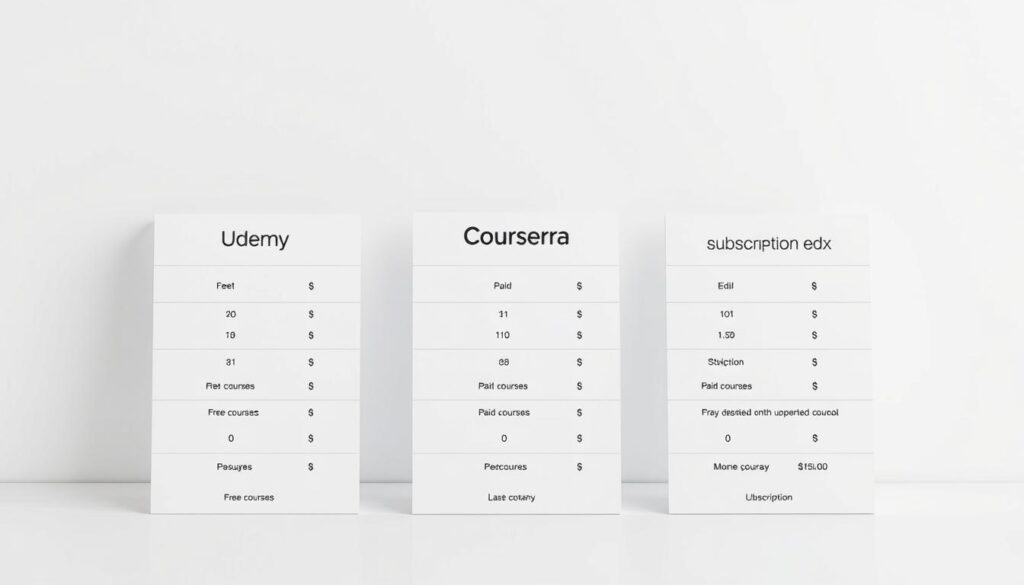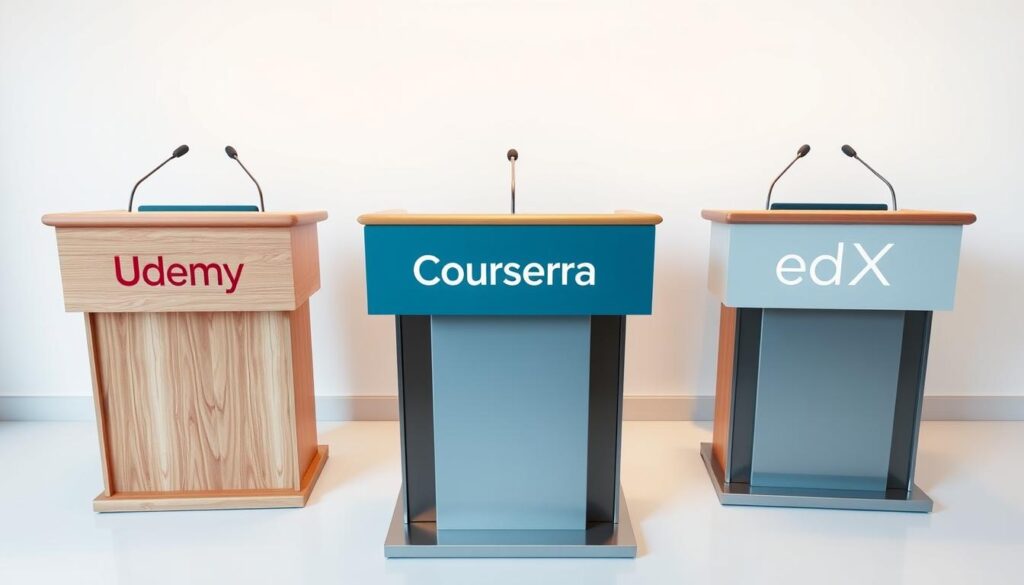Comparing Learning Platforms: Udemy vs. Coursera vs. edX
The rise of online education has transformed the way people access courses and degrees, untethered by time or location. At the forefront of this revolution are three prominent online learning platforms: Coursera, Udemy, and edX.
With numerous options available, selecting the right platform can be daunting. This article aims to provide a comprehensive course comparison of these three platforms, helping you make an informed decision about which one suits your needs best.
By examining their course offerings, pricing models, and instructor quality, we’ll give you a clear understanding of what each platform has to offer, enabling you to choose the best fit for your educational goals.
The Rise of Online Learning Platforms
Online learning platforms have revolutionized the way we acquire new skills and knowledge. Platforms like Coursera, Udemy, and edX have made high-quality education accessible to anyone with an internet connection.
The flexibility and convenience offered by these platforms have attracted a diverse range of learners, from professionals looking to upskill to students seeking to supplement their traditional education. The rise of online learning platforms is driven by the growing demand for accessible and affordable education.
These platforms offer a wide range of courses and degree programs, catering to different learning needs and preferences. As a result, online learning has become an increasingly popular choice for those looking to enhance their skills or change their career paths.

Comparing Learning Platforms: Udemy vs. Coursera vs. edX – An Overview
The online learning landscape is dominated by three key players: Udemy, Coursera, and edX. Each platform has carved out its niche, catering to different learning needs and preferences.
Coursera stands out for its academically rigorous courses, partnering with top universities worldwide. This makes it an excellent choice for those seeking structured, university-level education. In contrast, Udemy operates as a marketplace for independent instructors, offering a wide range of skill-based courses that are often more flexible and practical.
edX falls somewhere in between, offering a mix of academic and professional courses from top institutions. For learners looking for a more comprehensive learning experience, edX is a viable option. When choosing between these platforms, it’s essential to consider your learning goals. Are you looking for academic credit, or do you want to acquire a specific skill? For more information on finding the right courses, you can discover deals on online courses that fit your needs.
In summary, the choice between Udemy, Coursera, and edX depends on what you’re looking for in an online learning experience. By understanding the strengths of each platform, you can make an informed decision that aligns with your educational objectives.
Course Offerings and Variety
Choosing the right online learning platform involves evaluating the breadth and variety of its course offerings. Coursera, Udemy, and edX are three prominent platforms that cater to different learning needs through their diverse range of courses.
Coursera stands out with its specializations and degree programs, offering in-depth knowledge in specific areas. These programs are designed in collaboration with top universities, providing a comprehensive learning experience. For instance, Coursera’s specializations allow learners to dive deep into subjects like data science or business administration.
Unique Offerings on Each Platform
Udemy, on the other hand, is renowned for its vast library of skill-based courses. It offers a wide range of practical skills that are directly applicable in professional settings. Whether you’re looking to improve your marketing skills or learn a new programming language, Udemy’s diverse course catalog has something for everyone.

edX brings a unique value with its MicroMasters programs and XSeries courses. These offerings are designed to provide in-depth knowledge in specific areas, with a focus on academic rigor. edX’s courses are often developed by leading institutions, ensuring a high-quality learning experience.
In conclusion, the variety of course offerings on Coursera, Udemy, and edX makes each platform suitable for different learning goals. By understanding the unique strengths of each platform, learners can make informed decisions about where to pursue their educational objectives.
Pricing Models and Value
When it comes to online learning, the pricing models of Udemy, Coursera, and edX differ substantially. Understanding these differences is key to choosing the platform that best fits your budget and learning needs.
Coursera offers a freemium model, allowing learners to audit courses for free, but charging for certification. This model is beneficial for those who want to learn without committing to a purchase upfront. On the other hand, Udemy operates on a pay-per-course model, with prices ranging from $10 to $200. Once you purchase a course, you have lifetime access, making it an attractive option for budget-conscious learners.

To illustrate the differences, let’s compare the costs of similar courses on each platform. For instance, a course on Python programming might cost $20 on Udemy, while a similar course on Coursera could cost $49 for certification. On edX, a Python course might be available for free, but certification could cost around $100.
By comparing the pricing models and course costs, learners can make informed decisions about which platform offers the best value. Whether you’re looking for free courses or willing to pay for premium content, understanding the cost structures of Udemy, Coursera, and edX is crucial.
In conclusion, the choice between Udemy, Coursera, and edX depends on your learning needs and budget. By evaluating their pricing models and course offerings, you can select the platform that provides the best value for your money.
Instructor Quality and Teaching Approaches
Online learning platforms vary significantly in terms of instructor quality and teaching methodologies.Coursera’s courses are designed and taught by professors from top universities, ensuring high-quality content that is both academically rigorous and relevant to the industry.
Coursera’s partnerships with leading institutions like Stanford and Yale mean that learners are exposed to expert knowledge. In contrast, Udemy’s marketplace model allows industry experts to create and teach courses, resulting in a diverse range of course quality.
Udemy’s instructors vary in terms of quality, but many are experienced professionals who bring real-world insights into their teaching. Meanwhile, edX’s courses are taught by top instructors from leading institutions, similar to Coursera, ensuring a high level of academic rigor.

The teaching approaches on these platforms also differ. Coursera and edX focus on more traditional academic structures, with video lectures, readings, and assignments. Udemy courses, while also video-based, can vary significantly in terms of structure and teaching style, depending on the instructor.
Ultimately, the choice between Udemy, Coursera, and edX depends on what you value most in an online learning experience. If academic rigor and university-level instruction are important, Coursera or edX might be the better choice. If you’re looking for practical, industry-specific skills taught by professionals, Udemy’s diverse course offerings might be more suitable.
User Experience and Platform Features
A seamless user experience is crucial for online learners, and platforms like Udemy, Coursera, and edX are leading the way. The user experience on these platforms significantly impacts learner engagement and overall satisfaction.
Coursera offers a user-friendly interface with features like discussion forums and peer-graded assignments, fostering a sense of community among learners. This approach not only enhances the learning experience but also encourages collaboration and feedback.
Udemy’s platform is also easy to navigate, with features like Q&A sections and course reviews that help learners make informed decisions about their courses. This transparency and interactivity contribute to a more engaging learning environment.
edX, on the other hand, offers a range of features including discussion forums and interactive exercises, promoting engagement and deeper understanding of the course material. The platform’s design and functionality play a crucial role in maintaining learner interest and motivation.
In conclusion, all three platforms prioritize user experience and offer unique features that cater to different learning needs. By understanding the strengths of each platform, learners can choose the one that best suits their preferences and learning styles.
Best Platform for Different Learning Needs
Different learners have different needs, and the right platform can make all the difference. Whether you’re looking for academically rigorous courses, skill-based training, or a mix of both, choosing the right online learning platform is crucial.
Coursera stands out for those seeking academically rigorous courses. With its partnerships with top universities worldwide, Coursera offers a wide range of courses that are both challenging and rewarding.
On the other hand, Udemy is ideal for learners looking for skill-based courses. Its vast array of courses, often created by industry professionals, makes it a great resource for those looking to enhance their professional skills.
edX offers a unique blend of academic and professional courses, making it a versatile choice for learners. With courses from leading institutions and companies, edX caters to a broad range of learning needs.
Ultimately, the best platform for you will depend on your individual learning goals. By considering what you want to achieve, you can choose the platform that best suits your needs.
Conclusion: Choosing the Right Platform for Your Learning Journey
Selecting the right online learning platform is a personal decision that depends on your individual needs and goals. By considering the course offerings, pricing models, instructor quality, and user experience on Coursera, Udemy, and edX, you can make an informed decision about which platform is best suited to your learning journey.
Whether you’re looking for academic rigor, skill-based courses, or flexibility, there’s a platform out there that’s right for you. Coursera offers university-level courses, while Udemy provides a wide range of skill-based courses. edX, on the other hand, offers a mix of both, with courses from top universities worldwide.
By comparing these platforms, you can choose the one that aligns with your learning goals and budget, ensuring a fulfilling online learning experience.






